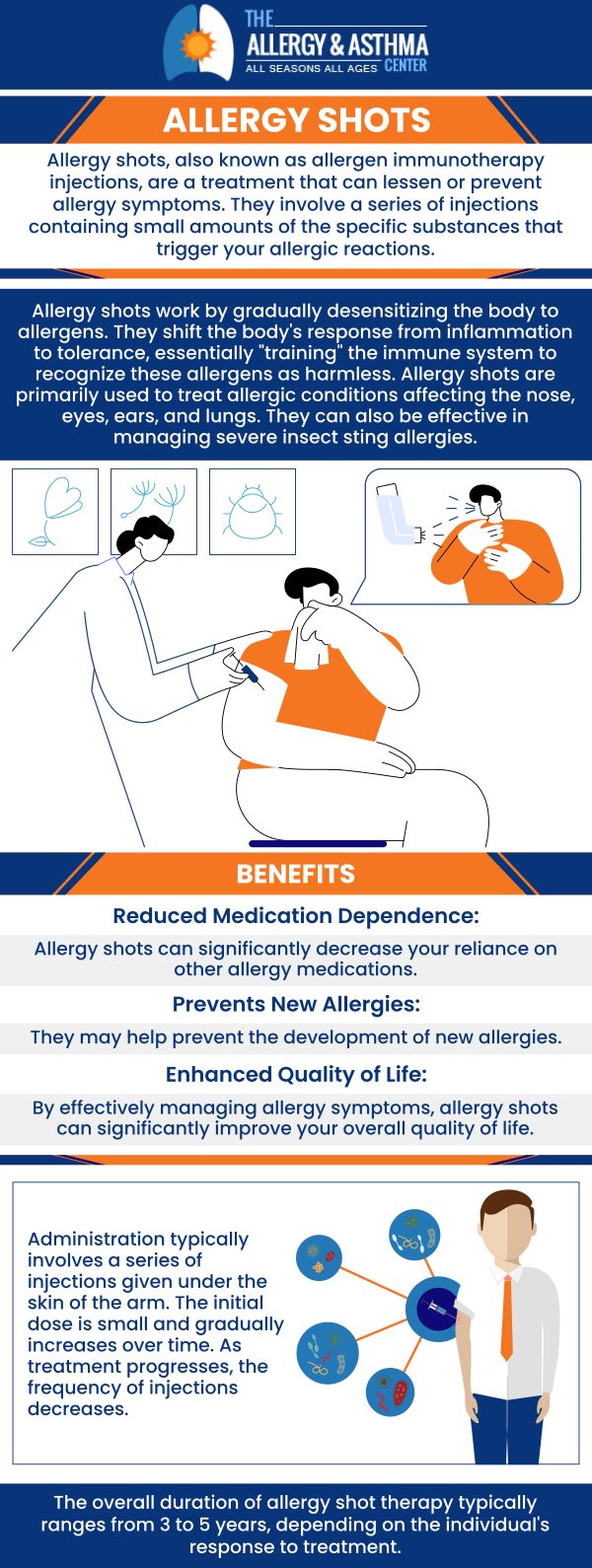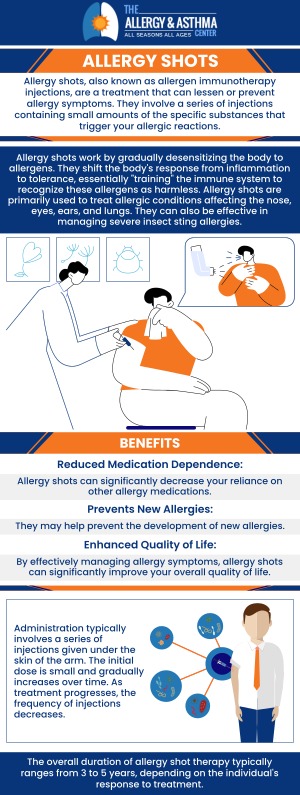Potential Reactions to Allergy Shots Q&A
Potential reactions to allergy shots can include localized symptoms such as redness, swelling, or itching at the injection site. Some individuals may also experience mild systemic reactions like sneezing, nasal congestion, or fatigue. It’s important for individuals receiving allergy shots to be aware of these potential reactions and to discuss any concerns with their healthcare provider. Allergy shots are available at the Allergy & Asthma Center, where Dr. Jon E. Stahlman, MD, and his dedicated team offer personalized care to ensure patients can experience relief from allergies and an improved quality of life. For more information, please contact us or book an appointment online. We serve patients from Lawrenceville GA, Atlanta GA, Conyers GA, Suwanee GA, Duluth GA, Grayson GA, Decatur GA, Brookhaven GA, Lithonia GA, and Covington GA.




Table of Contents:
What are the symptoms of an allergy shot reaction?
Can you have a delayed reaction to allergy shots?
Can allergy shots trigger an autoimmune disease?
How long after an allergy shot can you react?
Allergy shots, a form of immunotherapy, are designed to reduce or stop the occurrence of allergy attacks by exposing the patient to small amounts of the substance responsible for their allergic reactions. Administered regularly, typically for three to five years, these shots gradually increase in dosage to stimulate the immune system without causing a full allergic reaction, building up tolerance over time.
This makes allergy shots an excellent option for individuals who cannot avoid their triggers or manage their symptoms well with medication, including those with insect sting allergies or seasonal or indoor allergies. Despite the overall goal of diminishing symptoms significantly, reactions to allergy shots can occur, varying from mild to severe.
The symptoms of an allergy shot reaction can vary widely, primarily because these shots contain the very substances to which the individual is allergic. Commonly, individuals may notice swelling, redness, or irritation at the injection site, which are mild and typically subside within a few hours.
However, more severe reactions can occur, including systemic reactions such as hives, sneezing, nasal congestion, wheezing, throat swelling, and chest tightness. Anaphylaxis, a potentially life-threatening condition characterized by difficulty breathing and low blood pressure, is a rare but serious reaction that usually begins within 30 minutes of the injection, though it can occur later.
Despite the possibility of such reactions, allergy shots are generally well-tolerated, especially when patients adhere to a regular dosing schedule and do not miss doses. Preventive measures, such as taking an antihistamine before receiving an allergy shot and being observed after the shot, can minimize the risks associated with these reactions.
Individuals can experience a delayed reaction to allergy shots, though such occurrences are relatively rare. Severe reactions typically occur quickly, in the rare instances they do occur, which is why patients are observed on-site at the Allergy & Asthma Center for 30 minutes following an allergy shot.
Delayed reactions, when they do occur, generally present within a few hours of the injection. The most common delayed reactions are localized and include itching, swelling, or bruising at the injection site. These symptoms are not typically cause for concern and can be managed effectively with simple at-home care.
However, if a severe reaction occurs on a delayed basis, the individual needs to seek immediate medical attention, such as visiting an emergency room. The monitoring protocol established by healthcare providers ensures that any potential delayed reactions are anticipated and managed effectively, prioritizing patient safety and well-being.
The concern that allergy shots, which modify the immune system’s response to allergens, could potentially trigger an autoimmune disease is understandable given that autoimmune diseases occur when the body’s immune system mistakenly attacks healthy tissue.
However, the correlation between receiving allergy shots and the onset of autoimmune diseases is considered to be low. Studies have not shown allergy shots to increase susceptibility to autoimmune diseases significantly more than allergies themselves might. While the precise causes of many autoimmune disorders remain largely unknown, the current understanding is that allergy shots do not directly trigger the onset of these conditions.
Reactions to allergy shots can occur at various times post-injection, but most reactions tend to occur within 30 minutes, which is why patients are observed after their shots. While it is uncommon, some side effects or reactions may manifest later.
These delayed reactions are usually localized to the injection site and include symptoms such as itching, swelling, or bruising, typically mild and manageable with home care. If a patient notices a worsening of symptoms after leaving the healthcare facility, they need to communicate this with their healthcare provider or seek emergency medical care if the symptoms are severe.
The Allergy & Asthma Center carefully monitors and adjusts the dosages of allergy shots over time to ensure a safe and effective treatment for patients, aiming to minimize the risk of adverse reactions while improving long-term control over allergy symptoms.
Allergy shots are available at the Allergy & Asthma Center.
Experience effective allergy treatment and reclaim your quality of life at the Allergy & Asthma Center with Dr. Jon E. Stahlman, MD, and his dedicated team. Say goodbye to allergy symptoms and hello to a brighter, healthier future. Schedule your consultation today and start your journey towards long-lasting relief. For more information, please contact us or book an appointment online. We serve patients from Lawrenceville GA, Atlanta GA, Conyers GA, Suwanee GA, Duluth GA, Grayson GA, Decatur GA, Brookhaven GA, Lithonia GA, and Covington GA.

Additional Allergy & Asthma Services
▸ Allergy Shots
▸ Allergy Testing
▸ Asthma
▸ Bronchodilators
▸ Drug Allergy
▸ Food Allergy
▸ Insect Allergy
▸ Nasal/Sinus Allergies
▸ Pediatric Allergy
▸ Pediatric Asthma
▸ Skin Allergy
▸ Spring Allergies




